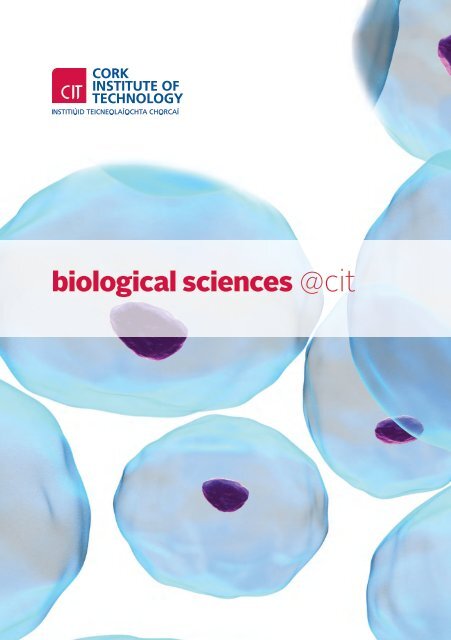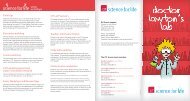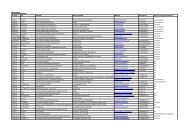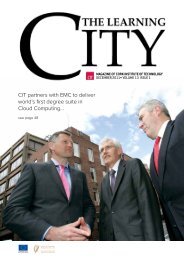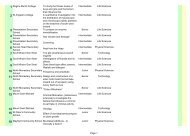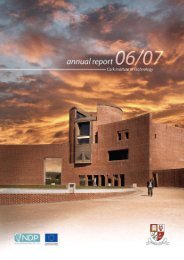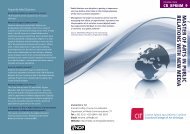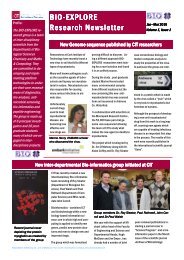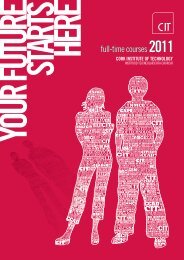biological sciences @cit - Cork Institute of Technology
biological sciences @cit - Cork Institute of Technology
biological sciences @cit - Cork Institute of Technology
Create successful ePaper yourself
Turn your PDF publications into a flip-book with our unique Google optimized e-Paper software.
iological <strong>sciences</strong> <strong>@cit</strong>
iological <strong>sciences</strong> <strong>@cit</strong><br />
Thank you for taking the time to read our departmental<br />
brochure. We hope that you find the information you need to<br />
plan the next step <strong>of</strong> your scientific career. Our department<br />
has always been one <strong>of</strong> the premier providers <strong>of</strong> biology<br />
related courses in the country, and we look forward to<br />
training the next generation <strong>of</strong> future biologists.<br />
Dr Brendan O’Connell (Head <strong>of</strong> Department).<br />
Department <strong>of</strong> Biological Sciences …<br />
• Experienced provider <strong>of</strong> career focused education<br />
• Expert training with high practical content in all our courses<br />
• Modern teaching facilities<br />
• 16 week work placement programme<br />
• Innovative research and development ethos<br />
• Strong industry collaborations<br />
• Small class sizes
All our courses are designed to be career focused ensuring each graduate is<br />
equipped with the necessary skills to maximise their employment potential.<br />
CR 006 BSc in Applied Bio<strong>sciences</strong> (Common Entry) 4<br />
> BSc in Applied Bio<strong>sciences</strong> & Biotechnology or BSc in Food & Health Science<br />
Potential Areas <strong>of</strong> Employment<br />
• Pharmaceutical Industry<br />
• Food and Healthcare Industries<br />
CR 320 BSc (Honours) in Biomedical Sciences 6<br />
Potential Areas <strong>of</strong> Employment<br />
• Medical Scientist in Hospitals<br />
• Biopharmaceutical & Biotechnology Industries<br />
• Public Health<br />
• Sales & Marketing <strong>of</strong> Medical Products<br />
CR 330 BSc (Honours) in Herbal Science 8<br />
Potential Areas <strong>of</strong> Employment<br />
• Healthcare, Biopharmaceutical and Cosmetic Industry<br />
• Food and Nutraceutical Industry<br />
• Plant Production and Natural Product ingredient manufacture<br />
• Clinical Herbal Medicine after further training<br />
CR 333 BSc (Honours) Nutrition & Health Science 10<br />
Potential Areas <strong>of</strong> Employment<br />
• Research Scientist in food, nutraceutical, and related healthcare industries<br />
• Production, Management and Marketing in food, nutraceutical and related healthcare industries<br />
• Governmental agencies responsible for food<br />
• Quality Assurance<br />
CR 325 BSc (Honours) Pharmaceutical Biotechnology 12<br />
Potential Areas <strong>of</strong> Employment<br />
• Quality Analyst in Biotechnology or related industry<br />
• Research Scientist<br />
• Analytical Microbiologist<br />
• Bio-assay Specialist<br />
• Environmental Biotechnologist<br />
Employer focused courses<br />
We place a great emphasis on training biologists for real world positions. With this in<br />
mind, we incorporate significant practical content into all our courses. Additionally,<br />
in 3rd year, all our students participate in a 16 week work placement programme<br />
based in a relevant scientific industry or company, either locally or internationally.<br />
Consequently our graduates have a distinct advantage when applying for full time<br />
positions.
4<br />
Applied Bio<strong>sciences</strong><br />
CR 006 Level 7 Award<br />
>> Progression to Honours Degrees &<br />
Postgraduate Programmes<br />
▲ Higher Certificate Option<br />
Application: CAO<br />
Award Title: Depends on Specialisation. Choose from:<br />
• Bachelor <strong>of</strong> Science in Food & Health Science<br />
• Bachelor <strong>of</strong> Science in Applied Bio<strong>sciences</strong> & Biotechnology<br />
Duration: 3 Years (6 Semesters)<br />
Places: 40<br />
Minimum Entry Requirements<br />
Leaving Certificate in 5 Subjects<br />
Maths<br />
Grad<br />
Subjects<br />
D3 (O/H)<br />
Subjects<br />
C3 (H)<br />
Maths<br />
Grade<br />
www.cit.ie/<strong>biological</strong><strong>sciences</strong><br />
English or<br />
Irish Grade<br />
5 0 D3 (O/H) D3 (O/H)<br />
What is Applied Bio<strong>sciences</strong>?<br />
Applied Bio<strong>sciences</strong> is the study <strong>of</strong> complex <strong>biological</strong> systems,<br />
and how they work, for example how bacteria generate<br />
energy from the breakdown <strong>of</strong> sugars. Applied Bio<strong>sciences</strong><br />
also involves the use <strong>of</strong> living organisms and bioprocesses in<br />
engineering, technology, medicine and agriculture – in other<br />
words, the application <strong>of</strong> scientific and technical advances in<br />
the life <strong>sciences</strong> to develop commercial products.<br />
Helpful Leaving Certificate Subjects<br />
Chemistry, Biology, Physics, and Mathematics.<br />
Work Placement<br />
There is a mandatory work placement <strong>of</strong> a minimum <strong>of</strong> 16 weeks<br />
in Year 3.<br />
Potential Areas <strong>of</strong> Employment<br />
• Pharmaceutical Industry<br />
• Food and Healthcare Industries<br />
myCIT<br />
myCourse<br />
“The course provides a fantastic range <strong>of</strong> both<br />
lectures and labs that are delivered by dedicated<br />
and approachable lecturers who are both<br />
interested in what they teach and up-to-date<br />
in their course material. The work placement<br />
element in Year 3 provides a great opportunity to<br />
experience a real working environment.”<br />
Chloe Huseyin<br />
www.cit.ie/course/CR006
Module Information<br />
http://modules.cit.ie/cr006<br />
About the Course<br />
In CR 006 Applied Bio<strong>sciences</strong>, Years 1 and 2 are common.<br />
Students will not be required to choose their preferred<br />
qualification (Food & Health Science or Applied Bio<strong>sciences</strong><br />
and Biotechnology) until the beginning <strong>of</strong> Year 3.<br />
Knowledge <strong>of</strong> environmental science, analytical techniques,<br />
quality management and bioprocessing are seen as key<br />
requirements and these disciplines are studied in detail.<br />
Laboratory work forms a substantial part <strong>of</strong> the course. The<br />
development <strong>of</strong> high-level laboratory skills and the ability to<br />
use them in the service <strong>of</strong> advanced industrial biology are key<br />
aims <strong>of</strong> the course. Opportunities currently exist for a number<br />
<strong>of</strong> students on courses to participate in EU funded exchange<br />
programmes involving colleges and enterprises in Europe.<br />
The Bachelor <strong>of</strong> Science in Applied Bio<strong>sciences</strong> and<br />
Biotechnology meets the demands <strong>of</strong> biotechnology,<br />
food and pharmaceutical industries for technologists and<br />
analysts. In addition, the requirements <strong>of</strong> the services and<br />
research laboratories for staff trained in advanced <strong>biological</strong>ly<br />
based analytical techniques are met by graduates <strong>of</strong> the<br />
course.<br />
The Bachelor <strong>of</strong> Science in Food & Health Science<br />
meets the changing needs <strong>of</strong> the Food, Pharmaceutical<br />
and Biotechnology industries for technicians and analysts.<br />
Graduates are in great demand from multinational<br />
pharmaceutical companies, as well as the traditional<br />
employers in the food and drink sectors.<br />
Advanced manufacturing in the food, health care, cosmetic,<br />
pharmaceutical and chemical industries have been<br />
employment destinations for graduates <strong>of</strong> this course as well<br />
as state and local authority laboratories.<br />
Further Studies<br />
For details, see www.cit.ie<br />
Suitably qualified graduates <strong>of</strong> the BSc in Food & Health<br />
Science may apply for entry to Year 4 <strong>of</strong><br />
> BSc (Honours) in Nutrition & Health Science<br />
Suitably qualified graduates <strong>of</strong> the BSc in Applied Bio<strong>sciences</strong><br />
& Biotechnology may apply for entry to Year 4 <strong>of</strong><br />
> BSc (Honours) in Pharmaceutical Biotechnology<br />
Career Opportunities<br />
Graduates from this course have traditionally gained<br />
employment in the Pharmaceutical, and Food and Healthcare<br />
industries, where graduates function in a variety <strong>of</strong> roles<br />
including; quality analysts, microbiologists, purification<br />
specialists, researchers and technicians. Graduates also have<br />
the option to progress to further academic studies at Level 8<br />
within the Department <strong>of</strong> Biological Sciences.<br />
CIT has developed a website which gives full details <strong>of</strong> all modules<br />
for all courses. The website also has information on recommended<br />
textbooks, average weekly workload, assessments and exams.<br />
Contact Information<br />
Dr Roy Sleator<br />
Department <strong>of</strong> Biological Sciences<br />
T: 021 433 5405<br />
E: roy.sleator<strong>@cit</strong>.ie<br />
Question Time<br />
If I am not sure what area <strong>of</strong> Biological Sciences I’d like<br />
to specialise in, would this be a good course choice for<br />
me?<br />
This course provides a broad grounding in the core principles<br />
<strong>of</strong> the <strong>biological</strong> <strong>sciences</strong>; allowing students to gain a solid<br />
understanding <strong>of</strong> core concepts and techniques for two years<br />
before deciding to specialise in their chosen field in Year 3.<br />
What personal skills are most suited to the course and<br />
subsequent careers?<br />
The best students and pr<strong>of</strong>essional biotechnologists all<br />
possess a keen interest in biology and a desire to understand<br />
how complex <strong>biological</strong> processes work.<br />
myCIT<br />
myCareer<br />
Jurate Daugelaite<br />
Postgraduate Student<br />
Following the BSc in Applied Bio<strong>sciences</strong><br />
and Biotechnology in 2009, Jurate<br />
undertook the BSc (Honours) in<br />
Pharmaceutical Biotechnology.<br />
She is currently pursuing the MSc in<br />
Computational Biology, a one year taught<br />
Master <strong>of</strong> Science programme at CIT’s<br />
Department <strong>of</strong> Biological Sciences and<br />
hopes to progress further to PhD level on<br />
completion <strong>of</strong> the Masters.<br />
5
6<br />
Biomedical Science<br />
(Honours)<br />
CR 320 Level 8 Award<br />
>> Progression to Postgraduate Programmes<br />
Application: CAO<br />
Award Title: Bachelor <strong>of</strong> Science (Honours) in Biomedical Science<br />
Duration: 4 Years (8 Semesters)<br />
Places: 30<br />
Campus: CIT and UCC<br />
Minimum Entry Requirements<br />
Leaving Certificate in 6 Subjects<br />
Subjects<br />
D3 (O/H)<br />
Subjects<br />
C3 (H)<br />
4 2<br />
(Note 1)<br />
Maths<br />
Grade<br />
English and<br />
Irish Grade<br />
D3 (O/H) D3 (O/H)<br />
Note 1: A C3 at Higher Level must be obtained in a<br />
Laboratory Science subject (from Chemistry, Physics,<br />
Biology or Physics and Chemistry (joint)).<br />
NB: Agricultural Science is accepted as a subject<br />
and attracts CAO points, but does not meet the<br />
requirement for the Laboratory Science Higher C3<br />
subject.<br />
What is Biomedical Science?<br />
Biomedical Science is the term for the investigations carried out<br />
by Biomedical Scientists on samples <strong>of</strong> tissue and body fluids<br />
to diagnose disease and monitor the treatment <strong>of</strong> patients.<br />
Helpful Leaving Certificate Subjects<br />
Chemistry, Biology, Physics, Mathematics and<br />
English.<br />
Work Placement<br />
This work placement (clinical placement) is <strong>of</strong>fered postgraduately<br />
and is optional. However, in order for graduates to be<br />
eligible to work as Medical Scientists in hospitals in Ireland, they<br />
must have completed a clinical placement training which takes a<br />
full academic year.<br />
Potential Areas <strong>of</strong> Employment<br />
• Medical Scientist in Hospitals<br />
• Biopharmaceutical & Biotechnology Industries<br />
• Public Health<br />
• Sales & Marketing <strong>of</strong> Medical Products<br />
www.cit.ie/<strong>biological</strong><strong>sciences</strong><br />
myCIT<br />
myCourse<br />
The extensive laboratory training incorporated<br />
throughout the course combined with the clinical<br />
placement in a teaching hospital, allows me to<br />
become pr<strong>of</strong>icient in all disciplines <strong>of</strong> medical<br />
science. Each student was well known by lecturing<br />
staff which aids the learning process immensely<br />
as information and advice can be obtained easily.”<br />
Laura O’Brien<br />
www.cit.ie/course/CR320
Module Information<br />
http://modules.cit.ie/cr320<br />
About the Course<br />
This Honours Degree course is <strong>of</strong>fered jointly by <strong>Cork</strong> <strong>Institute</strong><br />
<strong>of</strong> <strong>Technology</strong> and University College <strong>Cork</strong>. Biomedical<br />
scientists work in partnership with doctors and other healthcare<br />
pr<strong>of</strong>essionals to perform many different roles in medical<br />
laboratories. Biomedical Science is a continually changing<br />
dynamic pr<strong>of</strong>ession and involves study <strong>of</strong> the diverse areas<br />
<strong>of</strong> medical science including Biochemistry, Microbiology,<br />
Cellular Pathology, Haematology and Transfusion Science. It<br />
provides training in state-<strong>of</strong>-the-art technologies to facilitate<br />
investigation <strong>of</strong> disease and medical research.<br />
Accreditation<br />
This Honours Degree course with clinical placement is fully<br />
accredited by the Academy <strong>of</strong> Medical Laboratory Sciences<br />
(AMLS).<br />
Further Studies<br />
For details, see www.cit.ie<br />
The CIT/UCC joint BSc (Honours) Degree in Biomedical<br />
Science is one <strong>of</strong> only three Honours Degrees in the Republic<br />
<strong>of</strong> Ireland which are recognised by the Academy <strong>of</strong> Medical<br />
Laboratory Sciences (pr<strong>of</strong>essional body) as enabling<br />
graduates to practise in hospitals in the State. However, this<br />
BSc (Honours) must be accompanied by clinical placement<br />
training. Graduates <strong>of</strong> the BSc (Honours) will be <strong>of</strong>fered the<br />
opportunity to complete this placement in a designated<br />
hospital laboratory.<br />
Suitably qualified graduates are eligible to apply for a<br />
postgraduate degree at CIT:<br />
> MSc in Biomedical Science (Taught)<br />
> MSc in Computational Biology (Taught)<br />
> MSc (by Research)<br />
> PhD<br />
Career Opportunities<br />
Biomedical Science prepares the student for a career in<br />
laboratory medicine and related areas in the health-care<br />
industry and biopharmaceutical industry. Biomedical Science<br />
graduates work as Medical Scientists in hospitals, and in<br />
research, the biopharmaceutical and biotechnology industries,<br />
public health and sales and marketing <strong>of</strong> medical products.<br />
Contact Information<br />
Dr Brigid Lucey<br />
Department <strong>of</strong> Biological Sciences<br />
T: 021 433 5484<br />
E: brigid.lucey<strong>@cit</strong>.ie<br />
CIT has developed a website which gives full details <strong>of</strong> all modules<br />
for all courses. The website also has information on recommended<br />
textbooks, average weekly workload, assessments and exams.<br />
Question Time<br />
What do you need to work as a Biomedical Scientist in<br />
Ireland?<br />
Graduates with a BSc (Honours) in Biomedical Science<br />
from CIT/UCC, GMIT, or DIT, who have completed clinical<br />
placement are eligible for membership <strong>of</strong> the Academy <strong>of</strong><br />
Medical Laboratory Science, which qualifies the graduate to<br />
practice as a Biomedical Scientist.<br />
Is it an advantage to have Chemistry and Physics<br />
coming into the course?<br />
It is always an advantage to have Chemistry and Physics<br />
coming into a course such as Biomedical Science. However, it<br />
is feasible to take up one or both <strong>of</strong> these subjects on entry to<br />
the course, and the first year programme is tailored to support<br />
students who enter the programme without prior knowledge<br />
<strong>of</strong> these subjects.<br />
What kind <strong>of</strong> person should you be?<br />
This pr<strong>of</strong>ession requires scientists who are mindful <strong>of</strong> their<br />
responsibility when dealing with human health. It also means<br />
that they are <strong>of</strong>ten privy to information concerning patients<br />
that they cannot divulge for ethical reasons other than in the<br />
course <strong>of</strong> their work.<br />
What is the time divide between CIT and UCC?<br />
The programme for the BSc (Honours) in Biomedical Science<br />
is taught equally by CIT and UCC, so this means that the<br />
students will expect to spend some days in one institution<br />
or the other. The timetable is arranged to minimise travel<br />
between the two colleges.<br />
myCIT<br />
myCareer<br />
Dr Annmarie Mollaghan<br />
Medical Scientist<br />
Having completed the BSc (Honours)<br />
in Biomedical Science in <strong>Cork</strong>,<br />
Annmarie began work as a Medical<br />
Scientist in the Microbiology<br />
Department <strong>of</strong> St. James’s Hospital<br />
in Dublin until she embarked on a<br />
postgraduate research scholarship at<br />
CIT in 2008.<br />
During the intervening period, until<br />
her graduation in October 2011 with<br />
a PhD in Molecular Biology, Annmarie<br />
also undertook short part-time locum<br />
positions as a Medical Scientist in<br />
the Irish Blood Transfusion Service<br />
(IBTS) in <strong>Cork</strong>, and in the Microbiology<br />
Department <strong>of</strong> the Bon Secours<br />
Hospital in <strong>Cork</strong>. She currently<br />
works as a Medical Scientist in the<br />
Microbiology Department <strong>of</strong> the <strong>Cork</strong><br />
University Hospital.<br />
7
8<br />
Herbal Science<br />
(Honours)<br />
CR 330 Level 8 Award<br />
>> Progression to Postgraduate Programmes<br />
Application: CAO<br />
Award Title: Bachelor <strong>of</strong> Science (Honours) in Herbal Science<br />
Duration: 4 Years (8 Semesters)<br />
Places: 20<br />
Minimum Entry Requirements<br />
Leaving Certificate in 6 Subjects<br />
Subjects<br />
D3 (O/H)<br />
Subjects<br />
C3 (H)<br />
Maths<br />
Grade<br />
English or<br />
Irish Grade<br />
4 2 D3 (O/H) D3 (O/H)<br />
What is Herbal Science?<br />
The Herbal Science programme covers all aspects <strong>of</strong> herbs<br />
and natural products with applications in the healthcare, food,<br />
cosmetic and biopharmaceutical industries.<br />
Helpful Leaving Certificate Subjects<br />
Biology, Chemistry and Mathematics.<br />
Work Placement<br />
There is a mandatory work placement <strong>of</strong> 10 weeks in Year 3.<br />
Non-Standard Applicants<br />
Encouragement will be given to non-standard applicants,<br />
including mature students, to enter the course. In the<br />
case <strong>of</strong> these applicants, their academic qualification<br />
and recognised prior learning (RPL) will be assessed and<br />
evaluated by the Department <strong>of</strong> Biological Sciences. It is<br />
anticipated that up to 30% <strong>of</strong> places will be <strong>of</strong>fered to nonstandard<br />
applicants.<br />
Potential Areas <strong>of</strong> Employment<br />
• Healthcare, Biopharmaceutical and Cosmetic<br />
Industry<br />
• Food and Nutraceutical Industry<br />
• Plant Production and Natural Product Ingredient<br />
Manufacture<br />
• Clinical Herbal Medicine after further training<br />
www.cit.ie/<strong>biological</strong><strong>sciences</strong><br />
myCIT<br />
myCourse<br />
“Although this course specialises in the science<br />
<strong>of</strong> herbs and natural products it <strong>of</strong>fers a broad<br />
range <strong>of</strong> subjects that can be applied to other<br />
fields <strong>of</strong> science. I cannot recommend this<br />
course highly enough, the skills and knowledge<br />
learned are very valuable.”<br />
Niamh O’Brien<br />
www.cit.ie/course/CR330
Module Information<br />
http://modules.cit.ie/cr330<br />
About the Course<br />
The main core <strong>of</strong> the programme is focused on the<br />
production, characterisation and applications <strong>of</strong> herbal<br />
extracts and natural products that are ingredients used in<br />
medicinal, pharmaceutical, cosmetic and food industries.<br />
The Herbal Science course is structured along streams <strong>of</strong><br />
study based on plant science and plant production, human<br />
body systems, food and nutrition, and herbs and natural<br />
product applications.<br />
The specific <strong>biological</strong> subjects are supported by more<br />
general analytical techniques and foundation skills that<br />
provide our graduates with broad scientific education while<br />
retaining an appropriate level <strong>of</strong> specialisation to <strong>of</strong>fer a wide<br />
range <strong>of</strong> opportunities in industry, in research or in business<br />
development.<br />
Further Studies<br />
For details, see www.cit.ie<br />
Suitable qualified graduates may progress to academic<br />
qualifications in a number <strong>of</strong> areas which include plant<br />
science, pharmacy, ethnobotany, microbiology, and<br />
pharmacognosy at Master’s and Doctoral Degree level.<br />
The course gives the educational foundation necessary to<br />
pursue a career as a medical herbalist. The IIMH accepts<br />
and recognises this BSc Honours Degree as constituting<br />
Part 1 <strong>of</strong> its pr<strong>of</strong>essional training requirement for qualification<br />
as a medical herbalist/practitioner in Ireland. Further study/<br />
training is required to achieve Part 2 <strong>of</strong> the IIMH pr<strong>of</strong>essional<br />
requirements. The course also provides the student with<br />
an enormous opportunity to develop the skills necessary to<br />
commence herbal research or clinical training at an advanced<br />
level.<br />
Career Opportunities<br />
Graduates can expect to work in a variety <strong>of</strong> sectors<br />
including the Healthcare/Cosmetic Industry; Food Industry/<br />
Nutraceutical Industry; Biopharmaceutical Industry; Quality<br />
Control/Analysis; and Medicinal Plant Production.<br />
Contact Information<br />
Anna-Maria Keaveney<br />
Department <strong>of</strong> Biological Sciences<br />
T: 021 433 5402<br />
E: anna-maria.keaveney<strong>@cit</strong>.ie<br />
CIT has developed a website which gives full details <strong>of</strong> all modules<br />
for all courses. The website also has information on recommended<br />
textbooks, average weekly workload, assessments and exams.<br />
Question Time<br />
When I graduate, will I be based in a Lab?<br />
Graduates can work in a variety <strong>of</strong> settings from growing<br />
herbs and extracting natural products to manufacturing<br />
and production in a range <strong>of</strong> industries (cosmetic,<br />
biopharmaceutical, food, etc.). You can chose to work in a<br />
lab undertaking research and product development or quality<br />
control. You can make other choices based on the modules<br />
covered in this course for a wide variety <strong>of</strong> career options and<br />
work placements.<br />
What postgraduate qualification do you need to be<br />
qualified as a Herbalist?<br />
There are a number <strong>of</strong> options available to graduates when it<br />
comes to postgraduate study, including pr<strong>of</strong>essional training<br />
in Herbal medicine. If you chose to specialise in Herbal<br />
Medicine you will need further specialist postgraduate training<br />
accredited by the pr<strong>of</strong>essional body that can be contacted for<br />
further information.<br />
Alternatively you can pursue a research Master’s through CIT’s<br />
Graduate School which can be based in any one <strong>of</strong> a number<br />
<strong>of</strong> life science disciplines. From this you may choose to pursue<br />
a structured PhD such as the ED4LIFE programme which<br />
includes the tradition <strong>of</strong> original research but <strong>of</strong>fers graduates<br />
a range <strong>of</strong> generic and subject specific skills so that they are<br />
industry ready upon graduation. Generic modules include<br />
entrepreneurship, communications, personal effectiveness,<br />
and research methodology.<br />
Many other postgraduate opportunities can be availed <strong>of</strong> in<br />
other third level institutions in Ireland and abroad.<br />
myCIT<br />
myCareer<br />
Tracey Ryan<br />
Company Owner<br />
Tracey graduated in 2011 and has set<br />
up her own business, Bia Beauty.<br />
“I really enjoyed the broad range<br />
<strong>of</strong> subjects studied on the Herbal<br />
Science Degree, from Botany to<br />
Biochemistry. But what really helped<br />
me was the emphasis on Innovation,<br />
Entrepreneurship, and Product and<br />
Process Development.<br />
It was here that I got a taste <strong>of</strong><br />
business from which I have now<br />
set up my own company making<br />
and selling natural cosmetics.<br />
This Degree has prepared me in<br />
many ways to run my business,<br />
from selecting appropriate herbs,<br />
to researching their benefits and<br />
creating a suitable manufacturing<br />
environment.”<br />
9
10<br />
Nutrition & Health Science<br />
(Honours)<br />
CR 333 Level 8 Award<br />
>> Progression to Postgraduate Programmes<br />
Application: CAO<br />
Award Title: Bachelor <strong>of</strong> Science (Honours) in Nutrition &<br />
Health Science<br />
Duration: 4 Years (8 Semesters)<br />
Places: 40<br />
Minimum Entry Requirements<br />
Leaving Certificate in 6 Subjects<br />
Subjects<br />
D3 (O/H)<br />
Subjects<br />
C3 (H)<br />
Maths<br />
Grade<br />
English or<br />
Irish Grade<br />
4 2 D3 (O/H) D3 (O/H)<br />
What is Nutrition & Health Science?<br />
This course is designed to meet the need for technically<br />
competent managers, analysts and <strong>of</strong>ficers in the design,<br />
development, production, and upgrading <strong>of</strong> products which<br />
are ingested, injected, implanted, inhaled, inserted or topically<br />
applied to the bodies <strong>of</strong> humans or animals for the<br />
maintenance, restoration and promotion <strong>of</strong> their health and<br />
wellbeing.<br />
Helpful Leaving Certificate Subjects<br />
Biology, and Chemistry.<br />
Work Placement<br />
There is work placment <strong>of</strong> a minimum <strong>of</strong> 16 weeks in Year 3.<br />
Potential Areas <strong>of</strong> Employment<br />
• Research Scientist in food, nutraceutical, and related<br />
healthcare industries<br />
• Production, Management and Marketing in food,<br />
nutraceutical and related healthcare industries<br />
• Governmental agencies responsible for food<br />
• Quality Assurance<br />
www.cit.ie/<strong>biological</strong><strong>sciences</strong><br />
myCIT<br />
myCourse<br />
I’m delighted I chose this science course as it<br />
is very broad with modules ranging from Animal<br />
Physiology and Nutrition to Bio-Analytical Science.<br />
It <strong>of</strong>fers great experience in laboratories where<br />
we get to carry out experiments nearly five days a<br />
week. It’s always nice when a lecturer recognises<br />
you by name, something very common in CIT.<br />
Anne Bourke<br />
www.cit.ie/course/CR333
11<br />
Module Information<br />
http://modules.cit.ie/cr333<br />
About the Course<br />
First and second year modules provide the student with<br />
a strong foundation in nutrition as well as other <strong>biological</strong><br />
science modules such as cells, microbiology, biochemistry,<br />
biotechnology and science <strong>of</strong> food and health.<br />
Third and fourth year cover more specialised topics such as<br />
food and healthcare chemistry, toxicology and microbiology,<br />
clinical nutrition and population health, health products<br />
regulation, biomanufacturing and food processes as well<br />
as food innovation. The lectures are supplemented with<br />
relevant case studies, projects, assignments and there is a<br />
strong focus on gaining in depth practical experience in the<br />
laboratory.<br />
The work placement module is an integral and essential part<br />
<strong>of</strong> the course programme in which the student is introduced<br />
to a structured work environment. The student develops an<br />
understanding <strong>of</strong> the organisation, practices and procedures<br />
current in the organisation and the area <strong>of</strong> activity in which it is<br />
involved.<br />
Further Studies<br />
For details, see www.cit.ie<br />
This course is an excellent platform for further studies, both in<br />
terms <strong>of</strong> short add-on courses, and more structured<br />
post graduate degrees such as Master <strong>of</strong> Science and<br />
PhD programmes.<br />
CIT has developed a website which gives full details <strong>of</strong> all modules<br />
for all courses. The website also has information on recommended<br />
textbooks, average weekly workload, assessments and exams.<br />
Career Opportunities<br />
It is envisaged that a graduate <strong>of</strong> this course will be<br />
employed in any sector <strong>of</strong> the Food/Nutraceutical or<br />
Healthcare Industries. Areas such as: management,<br />
development, production, quality assurance or marketing<br />
<strong>of</strong> products and/or services for the Food, Nutrition, Medical<br />
Devices, Cosmetic, Pharmaceutical, Animal feed and<br />
Veterinary Care sectors. In addition, there are employment<br />
opportunities within governmental agencies responsible for<br />
food. Nutrition & Health Science Degree graduates have many<br />
opportunities to engage in continued education and training<br />
(e.g. pursue a career in Dietetics).<br />
Contact Information<br />
Dr Helena Stack<br />
Department <strong>of</strong> Biological Sciences<br />
T: 021 433 5919<br />
E: helena.stack<strong>@cit</strong>.ie<br />
Question Time<br />
Can I become a Dietician from CR 333?<br />
Completion <strong>of</strong> the BSc (Honours) in Nutrition & Health Science<br />
does not qualify the graduate to practice as a Dietician.<br />
However, graduates <strong>of</strong> the course CR 333 can undertake<br />
further studies in other third-level institutes to pursue a career<br />
as a Dietician.<br />
What personal skills are most suited to the course and<br />
subsequent careers?<br />
Individuals pursuing a career in Nutrition & Health Science<br />
should be dedicated, logical, analytically minded, good with<br />
people, a team player, have good attention to detail and<br />
excellent organisational skills.<br />
myCIT<br />
myCareer<br />
Julie Grace<br />
Postgraduate Student<br />
“I found first and second year covered a<br />
wide range <strong>of</strong> subjects which gave me<br />
a great understanding and foundation in<br />
Nutrition & Health Science.<br />
I gained excellent laboratory experience,<br />
which I was able to demonstrate in my<br />
third year work placement in Canada.<br />
I am currently studying for a Master’s<br />
in Food Science, from which I hope to<br />
gain employment in the area <strong>of</strong> quality<br />
assurance in a food related industry.<br />
Overall, I would highly recommend this<br />
course and thoroughly enjoyed my time<br />
in CIT.”<br />
11
12<br />
Pharmaceutical Biotechnology<br />
(Honours)<br />
CR 325 Level 8 Award<br />
>> Progression to Postgraduate Programmes<br />
Application: CAO<br />
Award Title: Bachelor <strong>of</strong> Science (Honours) in Pharmaceutical<br />
Biotechnology<br />
Duration: 4 Years (8 Semesters)<br />
Places: 25<br />
Minimum Entry Requirements<br />
Leaving Certificate in 6 Subjects<br />
Subjects<br />
D3 (O/H)<br />
Subjects<br />
C3 (H)<br />
Maths<br />
Grade<br />
English or<br />
Irish Grade<br />
4 2 D3 (O/H) D3 (O/H)<br />
What is Pharmaceutical Biotechnology?<br />
Many modern medicines such as vaccines, hormones, anticancer<br />
drugs are now made using <strong>biological</strong> cells. Insulin<br />
for example, which is used by diabetic patients worldwide<br />
is made using living cells as opposed to more traditional<br />
chemical synthesis based methods. This means there is a<br />
strong demand for biologists who can design innovative new<br />
medicines using <strong>biological</strong> approaches, and who have the<br />
skills to work with cells and the bio-active compounds they<br />
produce. This biotechnology course will teach students how to<br />
grow and engineer <strong>biological</strong> cells in order to make safe and<br />
effective medicines using the most up-to-date information and<br />
technologies available.<br />
Helpful Leaving Certificate Subjects<br />
Biology, and Chemistry.<br />
Work Placement<br />
There is a mandatory work placement <strong>of</strong> a minimum <strong>of</strong> 16 weeks<br />
in Year 3.<br />
Potential Areas <strong>of</strong> Employment<br />
• QC Analyst<br />
• Microbiologist<br />
• Bio-assay Specialist<br />
• Research and Development<br />
www.cit.ie/<strong>biological</strong><strong>sciences</strong><br />
myCIT<br />
myCourse<br />
“This course provides you with great career<br />
opportunities. After graduation, I qualified for a<br />
research grant which allowed me to pursue my<br />
dream <strong>of</strong> getting a PhD.”<br />
Monika Koziel<br />
www.cit.ie/course/CR325
Module Information<br />
http://modules.cit.ie/cr325<br />
About the Course<br />
The course content is specifically designed to meet the needs<br />
<strong>of</strong> the many relevant employers both nationally and<br />
internationally, and contains topical, cutting edge, industry<br />
specific material. The lectures are supplemented with in<br />
depth analysis <strong>of</strong> relevant case studies, projects, assignments,<br />
interactive videos, web tools and site visits. At least 50% <strong>of</strong><br />
the contact time is spent in the laboratory gaining practical<br />
experience.<br />
Work Placement is a mandatory part <strong>of</strong> this course. In Year 3,<br />
students will spend a minimum <strong>of</strong> 16 weeks in a local, national<br />
or internationally approved work environment.<br />
Many <strong>of</strong> the world’s top Biotechnology companies have<br />
a strong presence in Ireland. In general, the industry<br />
is moving towards a more “bio–based” approach to<br />
pharmaceutical manufacture. Consequently, there is a greater<br />
need to produce highly trained graduates who possess<br />
Pharmaceutical Biotechnology related skills. This course is<br />
designed to specifically meet this need.<br />
Further Studies<br />
For details, see www.cit.ie<br />
This course is an excellent platform for further studies, both in<br />
terms <strong>of</strong> short add-on courses, and more structured<br />
postgraduate degrees such as Master <strong>of</strong> Science and PhD<br />
programmes.<br />
CIT has developed a website which gives full details <strong>of</strong> all modules<br />
for all courses. The website also has information on recommended<br />
textbooks, average weekly workload, assessments and exams.<br />
Career Opportunities<br />
This course is very broad and is specifically designed to train<br />
students in all aspects <strong>of</strong> modern biotechnology. Graduates<br />
from this course are qualified to work in a number <strong>of</strong> areas<br />
within the biotechnology industry with many attaining<br />
employment immediately after graduating.<br />
Contact Information<br />
Dr Jim O’Mahony<br />
Department <strong>of</strong> Biological Sciences<br />
T: 021 433 5485<br />
E: jim.omahony<strong>@cit</strong>.ie<br />
Question Time<br />
Does this course qualify me as a Pharmacist?<br />
No. It trains you to work in the biotechnology industry where<br />
modern bio-medicines are discovered and made such as<br />
vaccines, hormones, antibodies and therapeutic enzymes.<br />
What personal skills are most suited to the course and<br />
subsequent careers?<br />
Good organisational skills, technical ability, team-working and<br />
ability to work to deadlines.<br />
Is the biotechnology industry secure?<br />
Pharmaceutical exports from Ireland typically exceed €24<br />
billion per year. Approximately 25% <strong>of</strong> all US biotechnology<br />
based imports come from Ireland. Despite the current<br />
economic situation, biotechnology is still very vibrant and<br />
remains one <strong>of</strong> the biggest national employers.<br />
myCIT<br />
myCareer<br />
Colm O’Shea<br />
Quality Control Analyst<br />
“I completed a BSc (Honours) in<br />
Pharmaceutical Biotechnology at CIT in<br />
2009. The course content and quality<br />
<strong>of</strong> lecturing were <strong>of</strong> a high scientific<br />
standard and I was much sought after by<br />
many <strong>of</strong> the multinationals here in Ireland.<br />
The work placement aspect <strong>of</strong> this<br />
course was invaluable in preparing me<br />
for the real working environment and<br />
provided a useful practical knowledge<br />
base. With the support and the quality <strong>of</strong><br />
the lectures at CIT, I was well equipped<br />
with the scientific knowledge and<br />
technical ability for a successful career.<br />
Shortly after graduating, I secured<br />
employment as a Cell Culture Scientist<br />
at Pfizer Biotechnology facility in<br />
Dublin. I have since moved to Janssen<br />
Biologics where I have a full-time<br />
position as a Quality Control Analyst in<br />
the Pharmaceutical Development and<br />
Manufacturing Science Department.”<br />
13
Research/Further Studies<br />
Some <strong>of</strong> our best graduates continue onto further studies after they complete<br />
their honours degrees.<br />
Many attain teaching qualifications, while others pursue MSc or PhD awards.<br />
As our qualifications are internationally recognised, graduates can complete their continuing education elsewhere or can<br />
re-register at CIT for a number <strong>of</strong> taught post-graduate courses including:<br />
> MSc in Biomedical Science CR_SBMSC_9<br />
> MSc in Computational Biology<br />
Our MSc and PhD researchers are constantly searching for new discoveries in food, health and agriculture that will impact<br />
positively on our daily lives.<br />
Graduates can also apply to join our MSc and PhD programmes conducted at the CIT based BIO-EXPLORE research<br />
centre.
Our research active lecturing<br />
staff have secured almost 110<br />
million in research funding over<br />
the last 10 years, allowing them<br />
to carry out world class public<br />
health based research at the<br />
CIT Department <strong>of</strong> Biological<br />
Sciences.
iological <strong>sciences</strong> <strong>@cit</strong><br />
www.cit.ie/<strong>biological</strong><strong>sciences</strong>


